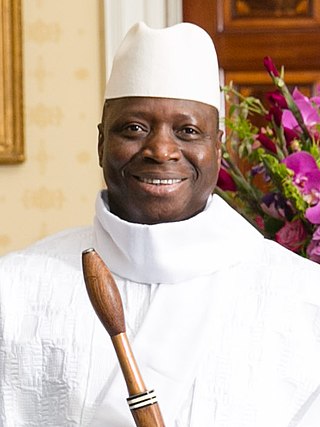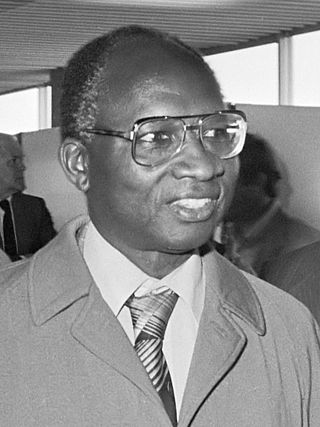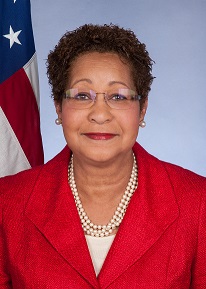
The Gambia, officially the Republic of The Gambia, is a country in West Africa. Geographically, The Gambia is the smallest country in continental Africa; it is surrounded by Senegal, except for its western coast on the Atlantic Ocean. It is situated on both sides of the lower reaches of the Gambia River, which flows through the centre of the country and empties into the Atlantic Ocean. The national namesake river demarcates the elongated shape of the country, which has an area of 11,300 square kilometres (4,400 sq mi) and a population of 2,468,569 people in 2024. The capital city is Banjul, which has the most extensive metropolitan area in the country; the second- and third-largest cities are Serekunda and Brikama.

The economy of the Gambia is heavily reliant on agriculture. The Gambia has no significant mineral or other natural resources, and has a limited agricultural base. About 75% of the population depends on crops and livestock for its livelihood. Small-scale manufacturing activity features the processing of peanuts, fish, and animal hides.

The Gambia Armed Forces, also known as the Armed Forces of The Gambia, consists of three branches: the Gambia National Army (GNA), the Gambia Navy, and the Republican National Guard (RNG). It formerly included the Gambia National Gendarmerie (GNG) from the 1980s to 1996, when they were moved under the jurisdiction of the Ministry of the Interior. The commander-in-chief is the president of the Gambia who is currently Adama Barrow, whereas practical control is exercised by the Chief of the Defence Staff who is currently Lieutenant General Yankuba Drammeh.

Yahya Abdul-Aziz Jemus Junkung Jammeh is a Gambian politician and former military officer, who served as President of the Gambia from 1996 to 2017, as well as Chairman of the Armed Forces Provisional Ruling Council from 1994 to 1996.

Sir Dawda Kairaba Jawara was a Gambian politician who served as Prime Minister from 1962 to 1970, and then as the first President of The Gambia from 1970 to 1994, when he was deposed.

The Bank of Israel is the central bank of Israel. The bank's headquarters is located in Kiryat HaMemshala in Jerusalem with a branch office in Tel Aviv. The current governor is Amir Yaron.

The dalasi is the currency of the Gambia that was adopted in 1971. It is subdivided into 100 bututs. It replaced the Gambian pound at a rate of 1 pound = 5 dalasis, i.e. 1 dalasi = 0.2 pound = 4 shillings.

Bakau is a town on the Atlantic coast of Gambia, west of Gambia's capital city of Banjul. It is known for its botanical gardens, its crocodile pool Bakau Kachikally and for the beaches at Cape Point. Bakau is the first major suburb outside Banjul and the most developed town in the Gambia. Close to Bakau and Banjul is Gambia's largest city, Serekunda.
The pound was the currency of the Gambia between 1965 and 1971. Gambia used the British West African pound until it issued its own currency on October 5, 1964. In 1971, the dalasi replaced the pound at a rate of £1 = D5. 1 pound was made up of 20 shillings, each shilling consisting of 12 pence.

The Gambia is divided into five administrative Regions and one City. The divisions of the Gambia are created by the Independent Electoral Commission in accordance to Article 192 of the National Constitution.
The Central Bank of Djibouti is the monetary authority of Djibouti. It is responsible for managing the country's currency, the Djiboutian franc, as well as the national foreign exchange position and accounting.

First Bank of Nigeria is a multinational bank and financial services company in Lagos, Nigeria. First Bank is owned by FBN Holdings PLC, which in itself has diversified ownership with over 1.3 million shareholders.

The Central Bank of Ecuador is the central bank of the country, and an institution of the Executive Function, which has institutional, administrative, financial, and technical autonomy. It is in charge of executing the monetary policy established by the Monetary Policy and Regulation Board of Ecuador, which has been the institution's highest governing body since October 2021.
The Central Bank of the United Arab Emirates is the state institution responsible for managing the currency, monetary policy, banking and insurance regulation in the United Arab Emirates.

Hassan Bubacar Jallow is a Gambian judge who has served as Chief Justice of the Gambia since February 2017. He was the Prosecutor of the International Criminal Tribunal for Rwanda (ICTR) from 2003 to 2016, and Prosecutor of the International Residual Mechanism for Criminal Tribunals (IRMCT) from 2012 to 2016, both at the rank of United Nations Under Secretary-General. He served as Minister of Justice and Attorney General from 1984 to 1994 under President Dawda Jawara.

The following outline is provided as an overview of and topical guide to the Gambia:

The Gambia–North Korea relations refers to the current and historical relationship between the Gambia and the Democratic People's Republic of Korea (DPRK), known as North Korea in the Western World. Hong Son-phy is the accredited ambassador to Banjul.
Mambury Njie is a Gambian politician and the current Minister of Finance and Economic Affairs in Adama Barrow's cabinet.

Carolyn Patricia "Pat" Alsup is a diplomat and former United States Ambassador to the Gambia. She was nominated by President Barack Obama on June 8, 2015, and confirmed by the Senate on October 8, 2015.

TheGambia–India relations refers to the international relations that exist between The Gambia and India. The Gambia maintains a High Commission in New Delhi. The Embassy of India in Dakar, Senegal is concurrently accredited to The Gambia, the only Anglophone country accredited to that mission. India also maintains an Honorary Consulate General in Banjul.















